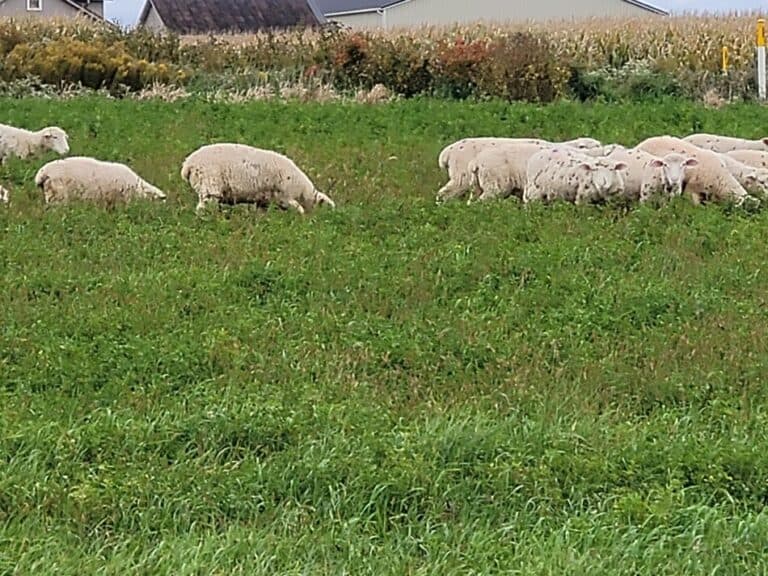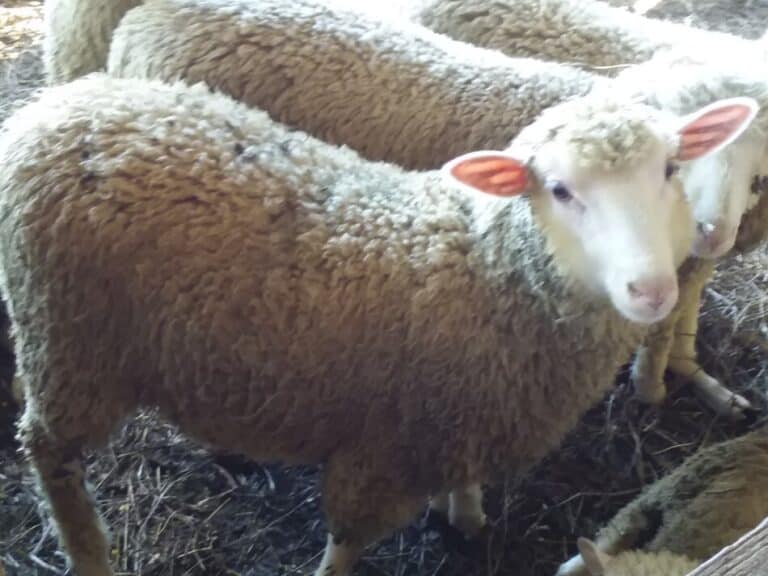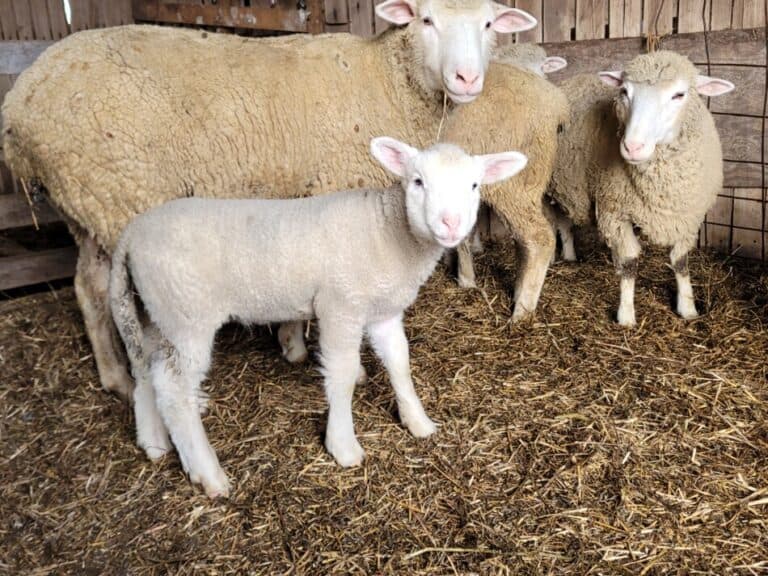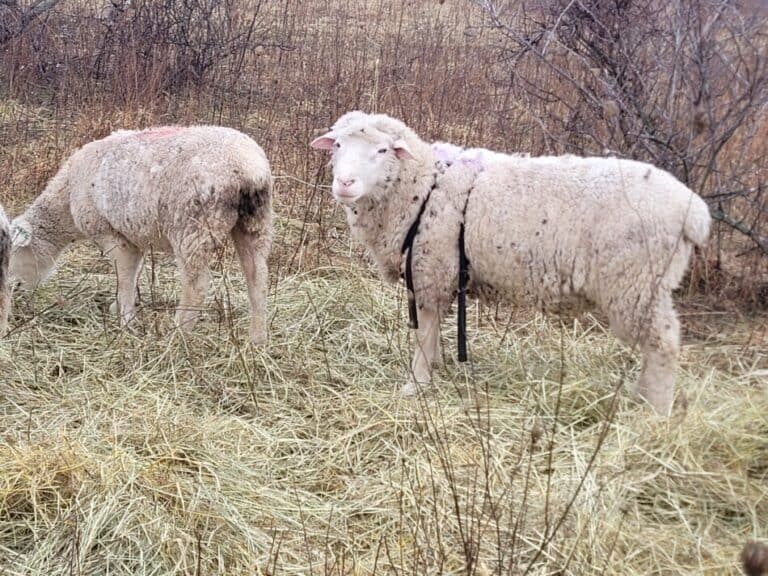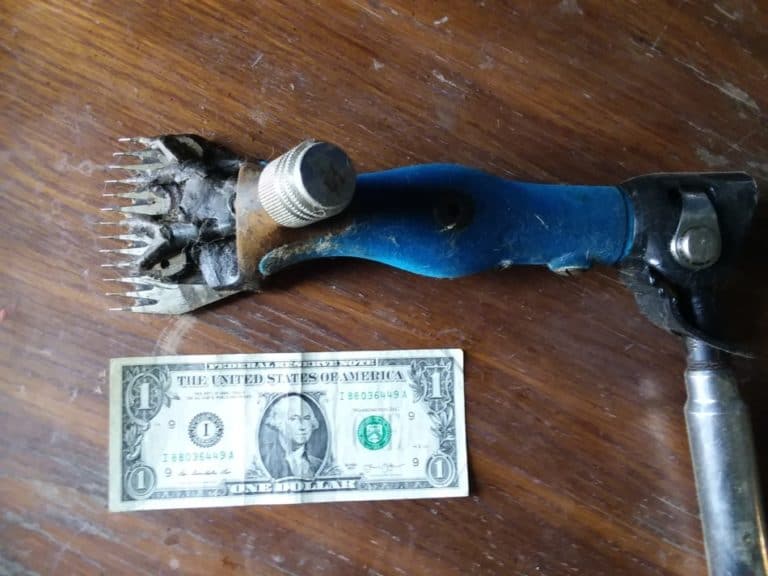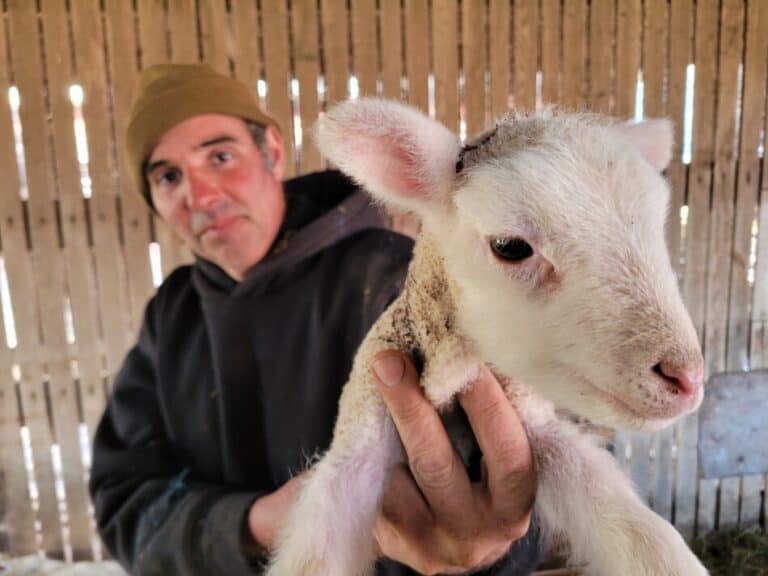The 8 Friendliest Sheep Breeds (Great For Beginners!)
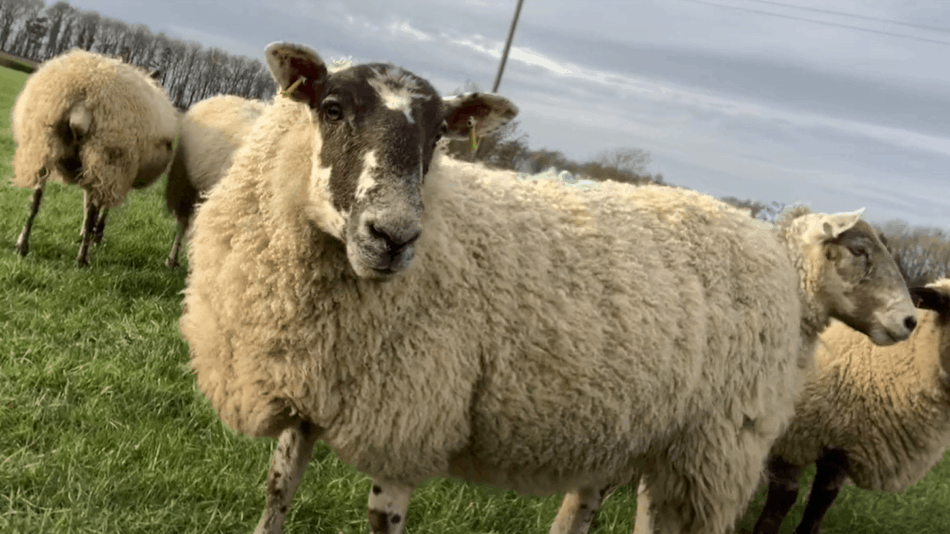
Sheep are becoming much more popular for small and large farmers, alike. Demand for lamb is high and sheep grow well on grass, an excellent match for you to make some money off of your pastures this year!
To use that grass, which sheep should you get? As a beginner, it’s important to get good stock that are friendly and easy to work with. Here are 8 breeds you should consider raising (listed alphabetically) and a few you should avoid!
Raising Sheep For Profit is an article I wrote to help you figure up your costs and potential revenue from your sheep, check it out if you are more interested in the business side of sheep.
| Main characteristic | Suggested Sheep Breeds To Consider |
| great market lambs | Suffolk |
| wonderful moms | Dorset, Polypay, Tunis |
| heat tolerance | Tunis |
| specialty fleece sales | Blue Faced Leicester, Border Leicester, Cotswold, Romney, Tunis |
| out of season lambing | Dorset, Polypay |
| commercial potential | Dorset, Polypay, Tunis |
Please note that each breed here has the potential to produce great market lambs! For this trait, Suffolk shines above the rest, which is why Suffolk is listed alone.
Blue Faced Leicesters are known for their good attitudes
Blue Faced Leicester sheep are a large British sheep that have a distinctive roman nose, “blue” face and are known for having wonderful attitudes.
Blue Faced Leicesters are ideal for: flocks where you can take advantage of their crossbreeding potential or are planning on selling specialty wool
In the U.S., Blue Faced Leicester sheep are not common and tend to be part of a hand spinner’s flock because the wool is fun to spin and sells well to other hand spinners.
In the U.K., BFL as Blue Faced Leicesters are called, are used as the sire breed that is crossed with a Scottish Blackface to produce a crossbred ewe the Scottish Mule, which is an incredibly popular production sheep cross there.
The BFL is specifically chosen because of it’s great easy going attitude and increased milk production, which compliments the hardy, but high strung Scottish Blackface breed.
Here’s an article about using BFL rams from the Blue Faced Leicester Union, it’s short and interesting. The speckle faced ewe above is out of a BFL ram, she’s owned by C. Wilson of The Sheep Game (YouTube).
Since BFL’s are so well known in the U.K., it amazes me that they are not more popular over here, especially since they are known for their wonderful attitudes.
As far as personal experience with the breed, I don’t have any, I only know of BFL by reputation.
However, there is an opportunity here. If the BFL is being kept in a spinners flock, not all of the sheep produced will be of the wool quality or color that the flock owner wants.
These could be wonderful sheep, just without the superior wool characteristics the flock owner is looking for. If someone close to your area raises BFL for wool, see if they have some stock for sale for production purposes.
Border Leicester sheep have longer wool
Border Leicester sheep are bit taller of a sheep with longer wool. They have a nice, clean head (no wool on top) and a more upright carriage that is attractive.
Border Leicester sheep are ideal for: farms that want fast growing lambs and have the ability to feed that growth
Here’s a link to an the American Border Leicester Association, which handles the showing and registration for Border Leicesters around here. Border Leicester’s are a popular show sheep, as well.
We have never had any Border Leicester sheep, but there are some in my region of the country, just none local that I know of.
They are surprisingly popular at breeding stock sales and have a calm demeanor with a very attractive look about them.
These sheep would be a great starter flock or an addition to your flock to increase hybrid vigor. Plus, buyers, at least around here, love the Cheviot type head that the Border Leicester has. These clean headed lambs always top the sale.
Border Leicester is another of the spinners flock type sheep here, but they wouldn’t have to be! In the U.K., they are quite popular as a purebred as well as a cross to produce commercial ewes for sheep farmers.
Here’s an overview of the Border Leicester’s advantages by Border Leicester Sheep Breeders.
Cotswold sheep are friendly
Cotswold sheep are a large sheep breed from England that is known for having long wool that hangs in ringlets.
Cotswold sheep are ideal for: someone interested in specialty wool sales or conservation of a rare breed
Cotswold sheep are very friendly. I had a Cotswold ram that was a real sweetheart, almost too friendly! I enjoyed having him around and that wool was something else!
The reason why we got a Cotswold was to see if we could take advantage of crossbreeding. We didn’t see much on that front, for our purposes the Cotswold was not a good choice, my best guess is that he had too much frame for us.
However, if you are looking for a friendly sheep, Cotswolds are definitely a contender. Be aware that they are pricey, especially if there are no breeders in your area.
Here’s a link to The Livestock Conservancy Cotswold page, giving breed history and stats.
Dorset sheep are a reliable choice for most beginners
Dorset sheep are medium sized, white sheep known for versatility, mothering ability and out of season lambing.
Dorset sheep are ideal for: farmers wanting to sell lambs (vs wool sales) and grass based operations
Dorset sheep are a solid recommendation for any beginner looking to get into sheep and definitely the breed I would recommend new folks look into.
Dorset sheep are pretty easy to handle, adaptable to most situations and are likely to have multiple births and can be out of season lambers, depending upon when you put in your rams, of course!
Dorsets seem to be more popular in farm areas versus ranch areas, so if you are in a more ranching part of the country, finding these gals might be tough.
If you are in a small farming area, these are likely to be the sheep your neighbor has. This is the case around here, a lot of Amish have a few sheep and most are going with a Dorset or Dorset cross because they work so well in this area.
My only caution on Dorset sheep is for you to get the “old style” which is a shorter, more widely built sheep that has been bred for commercial purposes.
There are also “show lines” that are much more leggy and taller sheep. Don’t get these, they are not what you want, unless you plan to show them! If you are not showing sheep, get the production type Dorsets.
Here’s a link to the Oklahoma State breed description for Dorset sheep.
Polypay sheep are a good all round sheep breed
Polypay sheep are an all round, easy to work with, productive sheep that can breed out of season.
Polypay sheep are ideal for: farmers wanting to sell lambs (vs wool) and grass based operations
Polypay sheep grow well on grass and are pretty easy to handle. Additionally, Polypay are becoming more popular around the country, so getting good stock is doable.
Polypay are good moms with a higher likelihood of multiple births and the potential for out of season lambing, just like the production type Dorset.
You may not have heard of Polypay before, but my guess is that you have seen them, you just didn’t know it! Check out this link to the Photo Gallery at the American Polypay Association for a look at the Polypay breed.
We raise Polypay/Dorset cross commercial sheep on grass. Our best ram is a Polypay, he’s an all star and working great for us. We lamb on grass and have the flock eating pasture only for the summer and into the fall.
Then we wean off the lambs, bring them into the barn to feed or for any replacement ewe lambs, we just kick them right back out on pasture to a field of only ewe lambs.
The Polypay are working great in our system. They are a maternal breed, so we get good mothering and a tendency toward multiple births. We also get most replacement ewe lambs to lamb at one year of age.
Polypay cross lambs do take more time to finish versus a breed that is short and stocky. But that actually works well for us, since early finishing lambs would add to the glut of lambs that time of year and get us lower prices.
We keep the lambs and feed them until January and start selling when prices are much higher!
Romney sheep are versatile
Romney sheep are a large, versatile sheep with a uniform fleece.
Romney sheep are ideal for: farmers that have plenty of feed and are considering specialty wool sales
Romney sheep, called Romney Marsh in England, were as the name suggests developed as more of a wet area sheep. Now they are popular with small farmers and hand spinners, due to their outstanding fleeces.
Here is a great breed description at Oklahoma State, Breeds of Livestock, Romney Sheep.
Romney is on my wish list of fleeces to buy and experiment with, they look amazing, all the colors! As you can tell, we do not have any Romney sheep, sadly!
I’ve always been interested in these gals, but along with being known for a bit slower growth and normally having one lamb, we have never worked with these genetics.
I do have to mention, there are New Zealand Romneys which are being used commercially in England, so the lack of production that I am aware of could easily be just the American Romneys kept for wool or show versus production.
Check out the American Romney Breeders Association if these gals are interesting to you.
Tunis are red headed, easy going sheep with more heat tolerance
Tunis are a red headed sheep, known for heat tolerance and mothering abilities.
Tunis sheep are ideal for: farmers in hotter areas, especially the southeast, and anyone considering expanding to have a commercial flock
Tunis sheep are a conservation breed, meaning they are a vulnerable population of sheep, even though Tunis have the potential to be profitable lamb producers. The Livestock Conservancy has a nice history of the Tunis breed here.
I have always found Tunis to be a beautiful breed and the fact that the lambs are born all red doesn’t hurt! Seriously, Tunis are a great all round sheep with the most heat tolerance of any on the list.
Please know that sheep do not like heat, so more heat tolerance than most does not make it a heat lover! It just makes Tunis more likely to do well in warmer areas of the country, like the southeast.
Suffolks are a calm, black faced sheep breed
Suffolk sheep are a tall, black faced breed from England that are popular as show sheep and are known for their ability to gain weight quickly.
Suffolk sheep are ideal for: farmers that want to sell larger market lambs, over 120 pounds, and have the feed to support that level of growth
Suffolks are very popular with folks who like to feed lambs to a larger weight, more like 120 pounds, then sell them. In some areas, this is common place. If you don’t mind feeding grain, Suffolks may do just fine for you.
Since they are a taller breed, the lambs will finish out at higher weights and need supplemental feed to do it. If you are wanting to raise all grass, or no grain sheep, you should consider a different breed.
Suffolk sheep are the ones producing the sharp looking black faced market lambs that you see at the auction or at the fair. Suffolk sheep have no wool on their heads, giving them a clean, shiny attractive head.
While I have not personally owned Suffolks, we have been around them for years. They seem to be more calm and slow reactors, this is a great thing for anyone wanting friendly sheep!
Suffolks are not only a nice market lamb producer, they are also a great choice to use in crossbreeding. Crossing Suffolk sheep with a white face breed will give you that pretty speckled face lamb that will gain like crazy.
Here’s more breed information from United Suffolk Sheep Association.
In the video above, Shepherd Ewan is petting a Suffolk. English Suffolk sheep (the original Suffolk sheep) tend to be shorter and stockier than American Suffolk sheep.
Choose calm individuals within the breed
When you are picking out your sheep, choose calm individuals within the flock.
How the flock reacts to people will vary with what they are used to, of course. Even so, some sheep will be much calmer than others in the same group raised under the same circumstances.
I have no studies to site on this, just our own experience, but I can tell you that “fruity” parents produce fruity acting lambs.
If you want easy to work with friendly sheep, choose your parent stock carefully.
Spend time with the flock
The other bit of advice I want to pass on is to spend some time with the sheep.
If they start to catch on that the only time you want them is for something they don’t want to do, they will start to avoid you.
If, on the other hand, most times you show up and they get a snack or moved to new grass or anything else they would like then the occasional catch for deworming or something similar is kind of washed out by the other times when you were handing out treats or just hanging out with them.
Avoid the “hill breeds” or “hardy breeds”
Breeds like Cheviot and Shetland are great sheep that have been bred to be spunky and take care of themselves. This makes them good sheep in the field but tough sheep to catch and handle.
Hill breed sheep are successful because they can live in a rougher area where they would get less contact with people, all the while raising a lamb. To make it without much help, these sheep have to be quick reactors and always wary.
Quick reactors means that they will run first and think second. While this is a normal sheep reaction, it is especially pronounced in hill or hardy breed sheep.
It’s kind of funny, the very thing that makes these breeds great at being low care, hardy sheep, also makes them tough to deal with! These are sheep breeds with too much spunk for a beginner.
Don’t get me wrong, these are wonderful sheep to raise and great a what they do (be productive in more difficult situations). They are just likely to be hard for a beginner to work with.
